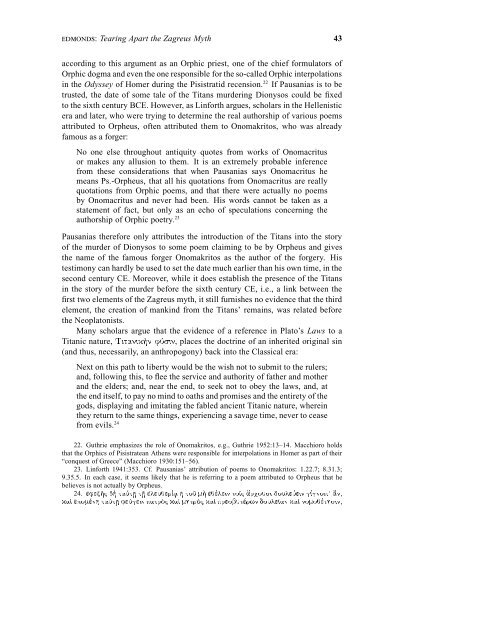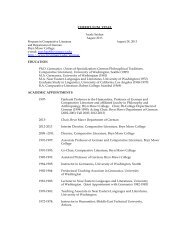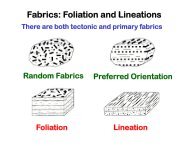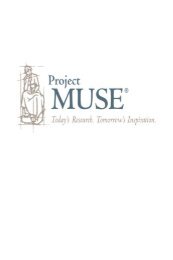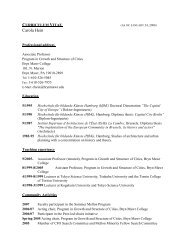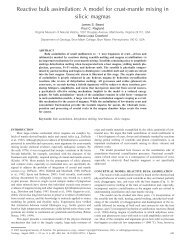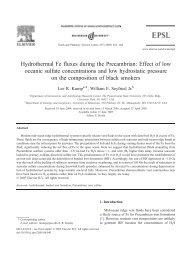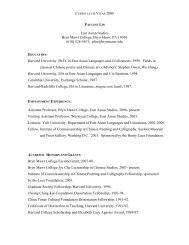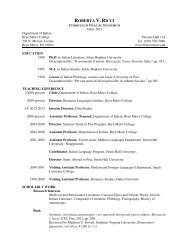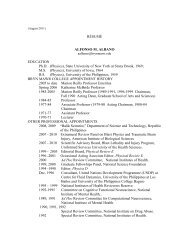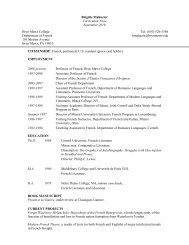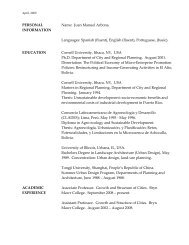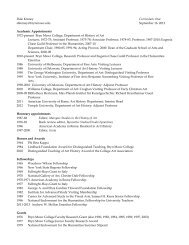Tearing Apart the Zagreus Myth - Bryn Mawr College
Tearing Apart the Zagreus Myth - Bryn Mawr College
Tearing Apart the Zagreus Myth - Bryn Mawr College
Create successful ePaper yourself
Turn your PDF publications into a flip-book with our unique Google optimized e-Paper software.
EDMONDS: <strong>Tearing</strong> <strong>Apart</strong> <strong>the</strong> <strong>Zagreus</strong> <strong>Myth</strong> 43<br />
according to this argument as an Orphic priest, one of <strong>the</strong> chief formulators of<br />
Orphic dogma and even <strong>the</strong> one responsible for <strong>the</strong> so-called Orphic interpolations<br />
in <strong>the</strong> Odyssey of Homer during <strong>the</strong> Pisistratid recension. 22 If Pausanias is to be<br />
trusted, <strong>the</strong> date of some tale of <strong>the</strong> Titans murdering Dionysos could be fixed<br />
to <strong>the</strong> sixth century BCE. However, as Linforth argues, scholars in <strong>the</strong> Hellenistic<br />
era and later, who were trying to determine <strong>the</strong> real authorship of various poems<br />
attributed to Orpheus, often attributed <strong>the</strong>m to Onomakritos, who was already<br />
famous as a forger:<br />
No one else throughout antiquity quotes from works of Onomacritus<br />
or makes any allusion to <strong>the</strong>m. It is an extremely probable inference<br />
from <strong>the</strong>se considerations that when Pausanias says Onomacritus he<br />
means Ps.-Orpheus, that all his quotations from Onomacritus are really<br />
quotations from Orphic poems, and that <strong>the</strong>re were actually no poems<br />
by Onomacritus and never had been. His words cannot be taken as a<br />
statement of fact, but only as an echo of speculations concerning <strong>the</strong><br />
authorship of Orphic poetry. 23<br />
Pausanias <strong>the</strong>refore only attributes <strong>the</strong> introduction of <strong>the</strong> Titans into <strong>the</strong> story<br />
of <strong>the</strong> murder of Dionysos to some poem claiming to be by Orpheus and gives<br />
<strong>the</strong> name of <strong>the</strong> famous forger Onomakritos as <strong>the</strong> author of <strong>the</strong> forgery. His<br />
testimony can hardly be used to set <strong>the</strong> date much earlier than his own time, in <strong>the</strong><br />
second century CE. Moreover, while it does establish <strong>the</strong> presence of <strong>the</strong> Titans<br />
in <strong>the</strong> story of <strong>the</strong> murder before <strong>the</strong> sixth century CE, i.e., a link between <strong>the</strong><br />
first two elements of <strong>the</strong> <strong>Zagreus</strong> myth, it still furnishes no evidence that <strong>the</strong> third<br />
element, <strong>the</strong> creation of mankind from <strong>the</strong> Titans’ remains, was related before<br />
<strong>the</strong> Neoplatonists.<br />
Many scholars argue that <strong>the</strong> evidence of a reference in Plato’s Laws to a<br />
Titanic nature, Titanik˜n fÔsin, places <strong>the</strong> doctrine of an inherited original sin<br />
(and thus, necessarily, an anthropogony) back into <strong>the</strong> Classical era:<br />
Next on this path to liberty would be <strong>the</strong> wish not to submit to <strong>the</strong> rulers;<br />
and, following this, to flee <strong>the</strong> service and authority of fa<strong>the</strong>r and mo<strong>the</strong>r<br />
and <strong>the</strong> elders; and, near <strong>the</strong> end, to seek not to obey <strong>the</strong> laws, and, at<br />
<strong>the</strong> end itself, to pay no mind to oaths and promises and <strong>the</strong> entirety of <strong>the</strong><br />
gods, displaying and imitating <strong>the</strong> fabled ancient Titanic nature, wherein<br />
<strong>the</strong>y return to <strong>the</strong> same things, experiencing a savage time, never to cease<br />
from evils. 24<br />
22. Guthrie emphasizes <strong>the</strong> role of Onomakritos, e.g., Guthrie 1952:13–14. Macchioro holds<br />
that <strong>the</strong> Orphics of Pisistratean A<strong>the</strong>ns were responsible for interpolations in Homer as part of <strong>the</strong>ir<br />
“conquest of Greece” (Macchioro 1930:151–56).<br />
23. Linforth 1941:353. Cf. Pausanias’ attribution of poems to Onomakritos: 1.22.7; 8.31.3;<br />
9.35.5. In each case, it seems likely that he is referring to a poem attributed to Orpheus that he<br />
believes is not actually by Orpheus.<br />
24. âfec¨j d˜ taÔthù t¨ù âleuqerÐaø toÜ m˜ âqèlein toØj Šrxousi douleÔein gÐgnoit' Šn,<br />
kaÈ ápomènh taÔthù feÔgein paträj kaÈ mhträj kaÈ presbutèrwn douleÐan kaÈ nomoqèthsin,


